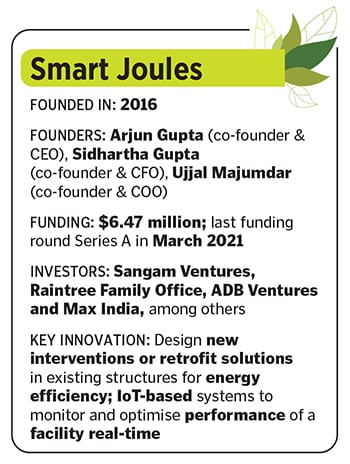Smart Joules: Decarbonising one company at a time
The Delhi-based energy-efficiency technology startup helps businesses, particularly hospitals, optimise power consumption; the excess electricity can be redirected to places that experience shortages


Energy efficiency is the lowest-hanging fruit in climate action, says Arjun Gupta. There are solutions and technologies that exist today, which are proven, scalable and profitable.
Gupta is co-founder and CEO of Delhi-based Smart Joules, an energy-efficiency technology startup, whose innovations help commercial businesses, particularly hospitals currently, optimise their energy requirements. The startup has a little over 40 clients across 25-odd cities in India, and Gupta claims to have generated an average energy savings of about 29 to 30 percent across the portfolio, meaning a “reduced energy cost of about Rs150 crore". The startup has prevented the release of 140,000 tonnes of carbon dioxide since it was launched in 2016, Gupta claims, and his target for the decade is to reach 29 million tonnes. He had started this company with co-founders Sidhartha Gupta (also CFO) and Ujjal Majumdar (also COO).
Smart Joules offers to design new interventions or retrofit solutions for energy systems in existing structures without the business having to incur additional capital expenditure. They have started out with offering their solutions to hospitals and facilities in the health care sector, due to the latter’s 24x7 nature of operations and high unit electricity costs. Apollo, Aster and Fortis, among others, are the hospitals it works with.
Gupta says over the years, they have collected granular data about energy consumption at the facility, systems and equipment level at hospitals, and this has been key to their ability to offer solutions without increasing capex burden of companies. For example, he says, they are working with a hospital that was traditionally designed for a cooling load of maximum 1,000 tonnes and had air conditioning systems with 1,300 tonnes of capacity. When they studied the facility, they realised that its cooling load was going to be a maximum 600 tonnes and the air conditioning capacity need not be more than 900 tonnes. “We were able to reduce 400 tonnes of capacity, purely on the basis of studying the energy consumption data."
 Their DeJoule technology platform deploys IoT (internet of things) systems and sensors to monitor and optimise the performance of a facility real-time. This means various energy-related functions at a facility, like fan speed controls, air supply monitoring, user comfort sensing, alerts, alarms and monitoring can happen real-time.
Their DeJoule technology platform deploys IoT (internet of things) systems and sensors to monitor and optimise the performance of a facility real-time. This means various energy-related functions at a facility, like fan speed controls, air supply monitoring, user comfort sensing, alerts, alarms and monitoring can happen real-time.
“We have replaced PLC [programmable logic controllers–basically industrial computers, with various inputs and outputs, used to control and monitor industrial equipment based on custom programming] technology with IoT control technology, which is more advanced in processing capacity, speed and data storage, where logics can be updated in real-time," Gupta explains. Second, software of traditional automation system used to be stored on an on-site server, which, in the case of Smart Joules, is entirely cloud-based.
Their payment is linked to the energy saving of the facility. This is to make sure they are incentivised to minimise energy costs. So far, Smart Joules has raised a total funding of close to $6.47 million, with the last funding round being a Series A of about $4.9 million in March 2021. Investors include Sangam Ventures, Raintree Family Office, ADB Ventures and Max India.
Since Smart Joules" revenues are directly linked with energy saved, the growth of the company is accompanied with positive environmental impact, says Mandar Gupte, CEO, Raintree Family Office, who participated in the Series A fundraise. He adds that with a long runway of growth ahead, the startup has created a niche in the hospital sector and developed stickiness with their existing client base. “They have a track record in winning multiple hospital contracts with large chains such as Apollo, which should help them win incremental businesses," says Gupte, adding that when they invested in the company in 2021, Smart Joules had about 16 projects with Rs12-13 crore of revenue. “Now they have more than doubled to about 42 projects, with revenues of Rs37 crore in FY23."
Smart Joules has been just as successful in larger facilities, as they have been in smaller ones, Gupte says, adding that revenue growth should also be accompanied by healthy return on invested capital in projects. “As the business grows, it is important to achieve operational excellence in terms of building strong teams, setting up systems and processes to be able to service different industries at scale and deliver the savings as promised," he says.
CEO Gupta, for his part, is clear about what he wants to do over the next few years: “Our strategy is to decarbonise, one company at a time," he says.
First Published: Aug 16, 2023, 15:01
Subscribe Now